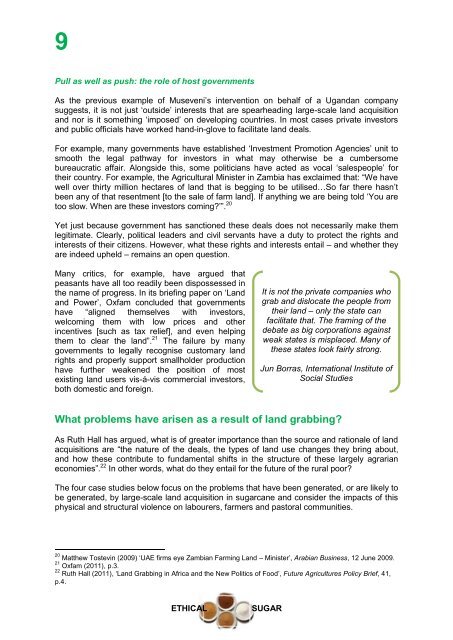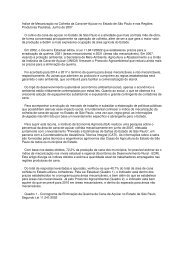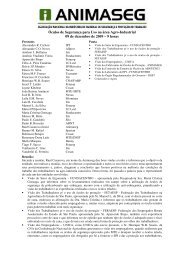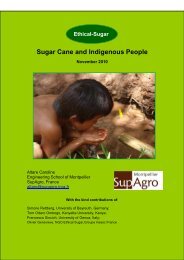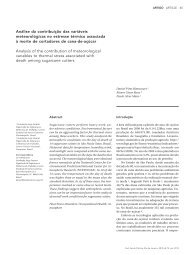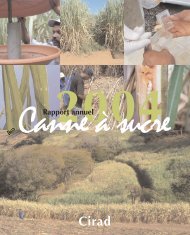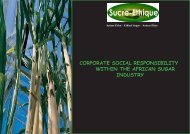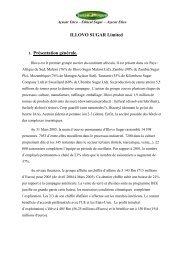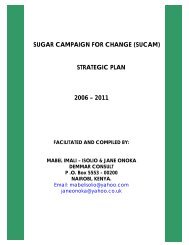August 2012 Sugarcane and the global land grab: A ... - Sucre Ethique
August 2012 Sugarcane and the global land grab: A ... - Sucre Ethique
August 2012 Sugarcane and the global land grab: A ... - Sucre Ethique
You also want an ePaper? Increase the reach of your titles
YUMPU automatically turns print PDFs into web optimized ePapers that Google loves.
9Pull as well as push: <strong>the</strong> role of host governmentsAs <strong>the</strong> previous example of Museveni’s intervention on behalf of a Ug<strong>and</strong>an companysuggests, it is not just ‘outside’ interests that are spearheading large-scale l<strong>and</strong> acquisition<strong>and</strong> nor is it something ‘imposed’ on developing countries. In most cases private investors<strong>and</strong> public officials have worked h<strong>and</strong>-in-glove to facilitate l<strong>and</strong> deals.For example, many governments have established ‘Investment Promotion Agencies’ unit tosmooth <strong>the</strong> legal pathway for investors in what may o<strong>the</strong>rwise be a cumbersomebureaucratic affair. Alongside this, some politicians have acted as vocal ‘salespeople’ for<strong>the</strong>ir country. For example, <strong>the</strong> Agricultural Minister in Zambia has exclaimed that: “We havewell over thirty million hectares of l<strong>and</strong> that is begging to be utilised…So far <strong>the</strong>re hasn’tbeen any of that resentment [to <strong>the</strong> sale of farm l<strong>and</strong>]. If anything we are being told ‘You aretoo slow. When are <strong>the</strong>se investors coming?’”. 20Yet just because government has sanctioned <strong>the</strong>se deals does not necessarily make <strong>the</strong>mlegitimate. Clearly, political leaders <strong>and</strong> civil servants have a duty to protect <strong>the</strong> rights <strong>and</strong>interests of <strong>the</strong>ir citizens. However, what <strong>the</strong>se rights <strong>and</strong> interests entail – <strong>and</strong> whe<strong>the</strong>r <strong>the</strong>yare indeed upheld – remains an open question.Many critics, for example, have argued thatpeasants have all too readily been dispossessed in<strong>the</strong> name of progress. In its briefing paper on ‘L<strong>and</strong><strong>and</strong> Power’, Oxfam concluded that governmentshave “aligned <strong>the</strong>mselves with investors,welcoming <strong>the</strong>m with low prices <strong>and</strong> o<strong>the</strong>rincentives [such as tax relief], <strong>and</strong> even helping<strong>the</strong>m to clear <strong>the</strong> l<strong>and</strong>”. 21 The failure by manygovernments to legally recognise customary l<strong>and</strong>rights <strong>and</strong> properly support smallholder productionhave fur<strong>the</strong>r weakened <strong>the</strong> position of mostexisting l<strong>and</strong> users vis-á-vis commercial investors,both domestic <strong>and</strong> foreign.It is not <strong>the</strong> private companies who<strong>grab</strong> <strong>and</strong> dislocate <strong>the</strong> people from<strong>the</strong>ir l<strong>and</strong> – only <strong>the</strong> state canfacilitate that. The framing of <strong>the</strong>debate as big corporations againstweak states is misplaced. Many of<strong>the</strong>se states look fairly strong.Jun Borras, International Institute ofSocial StudiesWhat problems have arisen as a result of l<strong>and</strong> <strong>grab</strong>bing?As Ruth Hall has argued, what is of greater importance than <strong>the</strong> source <strong>and</strong> rationale of l<strong>and</strong>acquisitions are “<strong>the</strong> nature of <strong>the</strong> deals, <strong>the</strong> types of l<strong>and</strong> use changes <strong>the</strong>y bring about,<strong>and</strong> how <strong>the</strong>se contribute to fundamental shifts in <strong>the</strong> structure of <strong>the</strong>se largely agrarianeconomies”. 22 In o<strong>the</strong>r words, what do <strong>the</strong>y entail for <strong>the</strong> future of <strong>the</strong> rural poor?The four case studies below focus on <strong>the</strong> problems that have been generated, or are likely tobe generated, by large-scale l<strong>and</strong> acquisition in sugarcane <strong>and</strong> consider <strong>the</strong> impacts of thisphysical <strong>and</strong> structural violence on labourers, farmers <strong>and</strong> pastoral communities.20 Mat<strong>the</strong>w Tostevin (2009) ‘UAE firms eye Zambian Farming L<strong>and</strong> – Minister’, Arabian Business, 12 June 2009.21 Oxfam (2011), p.3.22 Ruth Hall (2011), ‘L<strong>and</strong> Grabbing in Africa <strong>and</strong> <strong>the</strong> New Politics of Food’, Future Agricultures Policy Brief, 41,p.4.EthiclETHICALSUGAR


